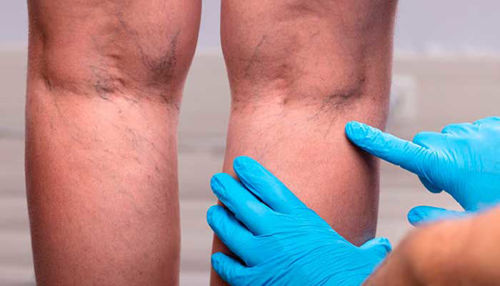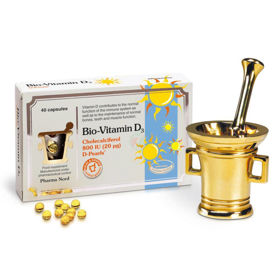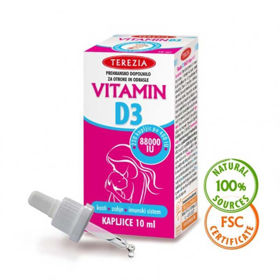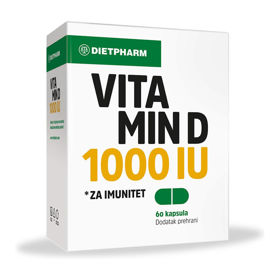Vitamin D is essential, as it helps maintain general health and well-being. It is necessary for the health of bones and teeth; it helps absorb calcium and phosphorus, which are essential for further strengthening and maintaining bones. Vitamin D deficiency can cause brittle bones and lead to bone diseases such as osteomalacia/rickets.
Vitamin D: What is vitamin D? | 5 Reasons | D vitamin in food | Recommended daily dose | Vitamin D deficiency - symptoms | Overdose complications | Questions and Answers | Sources/references
Vitamin D is both a nutrient and a hormone our body produces. It is a fat-soluble vitamin that has long been known to help the body absorb and retain calcium and phosphorus; both are critical for building bone. In addition, many body organs and tissues have receptors for vitamin D, which indicates the vital role of this vitamin, in addition to its significant impact on bone health.
Vitamin D is often called the "sunshine vitamin"; its purpose is to regulate the calcium and phosphate levels in our body, which contributes to stronger bones, teeth, and muscles. While we get vitamin D from many food sources, we get the most from U.V. exposure from sunlight on our skin, which is why winter is often associated with low vitamin D levels.
Vitamin D is produced in the presence of the sun's ultraviolet B (UVB) rays, hence its nickname "sun vitamin," but there are two types of vitamin D: D2, which is produced in plants and fungi, and D3, which is produced in animals, including humans. The production of vitamin D in the skin is the primary natural source of vitamin D. Still; many people have insufficient levels of this vital vitamin because they live in places with little sunlight in the winter or have limited sun exposure.
Video content: Vitamin D - all about it.

People with darker skin tend to have lower levels of vitamin D in their blood because the pigment (melanin) acts as a strong filter, which in turn reduces vitamin D production (and also reduces the harmful effects of sunlight on the skin, including skin cancer).< /p>
Five reasons to take vitamin D
Vitamin D is essential for the health of bones and teeth. It helps absorb calcium and phosphorus, which are necessary for strengthening and bone maintenance. Conversely, vitamin D deficiency can cause bone fragility and lead to bone diseases such as osteomalacia or rickets.
Vitamin D has beneficial effects on prostate, breast, and colon health. In addition, it is known that high levels of D of vitamins in the body reduce the risk of developing diseases related to the immune system.
Vitamin D can help maintain good general health and well-being. It allows the body to produce specific hormones and stimulates the immune system, which can help reduce the risk of certain diseases and infections. On the other hand, vitamin D deficiency can cause fatigue, exhaustion, and general malaise.
Video content: why do you need vitamin D?

Vitamin D helps in the division of body cells. Its deficiency results in problems in the duplication of cellular structures.
Vitamin D is essential for the health of the gums and teeth. Vitamin D deficiency can cause gum problems such as bleeding, inflammation, and loss of teeth. Conversely, high vitamin D levels can help maintain healthy gums and teeth.
Presence of vitamin D in food
Without a doubt, vitamin D is one of the essential micronutrients in your health. It is involved in practically all processes in the body, considering immunity and the brain's functioning. Researchers are still exploring the field of influence of this vital vitamin, and new ways of how vitamin D affects the human organism are regularly discovered. But, unfortunately, with Fra's limited choice of foods fortified with vitamin D and a considerable proportion of the population at risk of deficiency - many do not get enough of this vital vitamin.
Unfortunately, among today's processed foods, few contain vitamin D. For most people, the best way to get enough vitamin D is to take supplements, as it is challenging to get enough of it through food. Vitamin D supplements come in two forms: vitamin D2 ("ergocalciferol" or previtamin D) and vitamin D3 ("cholecalciferol").
Oily fish and seafood such as salmon, tuna, mackerel, oysters, shrimp, sardines, and anchovies are excellent sources of vitamin D and other healthy nutrients, but the levels are pretty low. Mushrooms are one of the few plant-based options for vitamin D absorption, but, as with oily fish, stories of the vitamin are pretty standard. Egg yolks also contain vitamin D. Opt for free-range chicken eggs; as with humans, the vitamin D content of this type of diet depends on how long the source survives in sunlight.
Video content: nutrition enriched with vitamin D!

By regularly including a few servings of foods high in vitamin D in your diet, you can help meet your needs, even if the time you spend in the sun is insufficient. In food sources, vitamin D is available in two different forms. Vitamin D3 (cholecalciferol) can be found in foods of animal origin, such as fish, while vitamin D2 (ergocalciferol) is located in other sources, such as mushrooms.
Vitamin D3 is considered a more active form. This is the type most commonly used in vitamin D supplements and multivitamins because it is more effective at raising serum vitamin D levels.
Which foods contain vitamin D
Here are some of the best sources of vitamin D to help you meet your daily needs:
- Cod liver oil
- Wild salmon
- Mackerel
- Tuna
- Whole milk
- Full-fat almond milk
- Full-fat coconut milk
- Morel mushrooms
- Full-fat yogurt
- Sardines
- Fresh orange juice
- Beef liver
- Eggs (especially yolks)
- Whole grains
- Caviar/fish roe
- Full-fat cheeses
- Shiitake mushrooms
- Oysters
Aim for one to two servings of foods with vitamin D per day. Try to include a good mix of vitamin D vegetables, dairy products, and oily fish to get a wide range of essential micronutrients in addition to vitamin D. Those who don't eat fish get enough vitamin D from food sources alone can be a little tricky. However, there are still plenty of vitamin D food options for vegetarians and vegans. In addition to fatty fish and liver, vitamin D can also be found in sources such as eggs and mushrooms and fortified products such as cereals, juices, and dairy products.
An example of a daily menu rich in vitamin D:
Breakfast:
- scrambled eggs with sliced fresh peppers and onions
- whole grain bread with butter or avocado (fresh)
- cocoa or orange juice (enriched with vitamin D)
Lunch:
- salmon salad with mixed vegetables, tomatoes, and avocado
- Whole grain flakes
- Cocoa/milk
Dinner:
- Roasted chicken with sweet potatoes and broccoli
- Enriched almond milk cocoa
Snacks:
- Greek yogurt with strawberries and honey
- almonds
- Cocoa or orange juice
This menu offers an excellent source of vitamin D from various sources, including vitamin D-rich milk, orange juice, eggs, and fatty fish such as salmon. It's also important to note that vitamin D can also be obtained from the sun's rays, so it's essential to spend some time outdoors during the day to increase your intake of this vital vitamin.
Recommended daily intake of vitamin D
Children under 12 months of age need at least 400 international units of vitamin D per day. Adults up to 70 years of age need at least 600 I.U. daily. Older adults need even more and should aim for at least 800 IU daily.
Video content: How much vitamin D do I need?

Although the dosages listed are the minimum requirements necessary for general health, the conditions may be even higher in some cases. If you're prone to vitamin deficiencies, it's best to talk to your doctor about what dosage is right for you.
If you decide to take a vitamin D supplement, choose a high-quality product and look for a form that uses vitamin D3 instead of vitamin D2 to help increase absorption in the digestive tract.
| Prevention | Dosage | |
| Adult (healthy) | 800-2,000 IU/day From the beginning of October to the end of April |
|
| Adults (threatened) |
|
|
| Children |
|
|
Vitamin D deficiency and symptoms
If you prefer to stay out of the sun, wear sunscreen, have a milk allergy, or follow a strict vegan diet, you may be at risk of vitamin D deficiency. Vitamin D is essential for strong bones because it helps the body absorb calcium from nutrition. Vitamin D deficiency has traditionally been associated with rickets, a disease in which bone tissue does not mineralize properly, leading to softer bones and consequent skeletal deformities. But research is increasingly revealing the importance of vitamin D in protecting against many health problems.
Symptoms such as bone pain and muscle weakness may indicate that you are deficient in vitamin D, but unfortunately, the signs are subtle for many people.
Insufficient vitamin D poses a health risk even without the listed symptoms.
Low blood levels of the vitamin are associated with the following:
- Increased risk of damage to the cardiovascular system
- Cognitive impairment in older adults
- Asthmatic diseases
- Cancer disease
What can cause vitamin D deficiency?
Vitamin D deficiency can occur for several reasons. First, the problem arises if you follow a strict vegan diet, as most natural sources of vitamin D are of animal origin, including fish and fish oil, egg yolks, fortified milk, and beef liver.
Because the body makes vitamin D when your skin is exposed to sunlight, you may be at risk of a deficiency, which is especially problematic in the following situations:
- you are tied to your home; you don't go outside
- live in northern latitudes,
- wear long clothes or head coverings for religious reasons or
- you work in a profession that prevents exposure to the sun.
In winter, vitamin D deficiency can be more common because less sunlight is available, and the melanin pigment further reduces the skin's ability to produce the vitamin. In addition, some studies show that older adults with darker skin are at high risk of vitamin D deficiency.
Video content: Vitamin D, deficiency, and hidden symptoms!

Vitamin D deficiency can also cause a condition where your kidneys cannot convert vitamin D into its active form. In addition, with aging, the kidneys are less able to convert vitamin D into its dynamic format, which increases the risk of deficiency.
A lack of this crucial vitamin can also affect your digestive tract. Certain medical conditions, including Crohn's disease, cystic fibrosis, and celiac disease, can affect the gut's ability to absorb vitamin D from the food you eat. As a result, people with a body mass index of 30 or more often have low vitamin D levels in their blood.
What are the consequences of consuming too much vitamin D?
Vitamin D poisoning, also called hypervitaminosis D, is a rare but potentially severe condition that occurs when you have excessive amounts of vitamin D in your body. Vitamin D toxicity is usually caused by high vitamin D supplements—not a diet or sun exposure. This is because your body regulates the amount of vitamin D it produces from sun exposure; even fortified foods do not contain large amounts of vitamin D.
The main consequence of excessive vitamin D is the accumulation of calcium in the blood (hypercalcemia), which can cause nausea and vomiting, weakness, and frequent urination. In addition, vitamin D toxicity can progress to bone pain and kidney problems such as calcium stone formation.
Treatment includes immediate cessation of vitamin D intake and dietary calcium restriction. Your doctor may also prescribe intravenous fluids and corticosteroids or bisphosphonates.
Taking 60,000 international units (I.U.) of vitamin D per day over several months has been shown to cause toxicity. This level is several times higher than the recommended dietary intake for most adults, which is 600 IU. of vitamin D per day. Higher-than-recommended doses are sometimes used to treat health problems such as vitamin D deficiency, but these are only given under a doctor's supervision for a specific time frame. Therefore, while taking increased doses of vitamin D, it is necessary to monitor the level of this vitamin and its increase in the blood.
As always, consult your doctor before taking vitamin and mineral supplements.
Questions and answers
How can I get vitamin D?
Vitamin D can be obtained from food enriched with this vitamin, such as seafood, egg yolk, liver, dairy products, and cereals. Vitamin D can also be obtained through exposure to the sun, as it is produced in the skin when exposed to ultraviolet radiation.
How much vitamin D do I need?
The recommended daily intake of vitamin D varies by age and gender. For adults, the recommended daily intake is 600-800 IU (international units) per day, while for the elderly and pregnant women, the recommended daily intake is usually higher. You can check the recommended daily amounts of vitamin D with your doctor or on the website.
What happens if I have a vitamin D deficiency?
Vitamin D deficiency in the long term often causes bone fragility, leading to many complications, such as osteomalacia or rickets, as well as sudden bone fractures. Deficiency also causes fatigue, exhaustion, and general malaise. If you suspect vitamin D deficiency, consult your doctor.
What happens if I consume too much vitamin D?
Excessive consumption of vitamin D over a long period can cause the accumulation of excessive levels of calcium in the blood, which can lead to problems with the functioning of the heart muscle and problems with blood vessels, kidneys, and nerves. If you suspect you have excessive vitamin D levels in your blood, consult your doctor.
How do I get enough vitamin D from my diet?
Enjoy foods such as seafood, egg yolk, liver, and foods fortified with vitamin D, such as dairy products and certain grains. Vitamin D can also be obtained through exposure to sunlight, as especially vitamin D2, which is a vitamin of plant origin, is transformed into vitamin D3 under the influence of U.V. radiation.
Exposure to the sun for 10 to 15 minutes a day is recommended. Still, it is also essential to protect yourself from overheating and possible burns and not to be exposed to direct sunlight in the summer between 12:00 and 16:00.
Why is vitamin D necessary?
Vitamin D is a nutrient the human body needs daily to build and maintain healthy bones. This is because your body can only absorb calcium, the main component of bones if vitamin D[1] is present.
What happens when vitamin D levels are too low?
Vitamin D deficiency, when the level of this vitamin in your body is too low, can cause your bones to become thin, brittle, or even misshapen. Vitamin D has many vital roles in the body, including a role in the functioning of the immune system, which is why the lack of this element is significant. A reliable study also predicts an association between vitamin D intake and cancer incidence[2].
Which fruit is rich in vitamin D?
Oranges are a vitamin D-fortified fruit, as the juice is rich in calcium and vitamin D. It is one of the best sources of vitamin D for people who are lactose intolerant and cannot incorporateand milk and milk products in their diet[3].
Sources and references
1. Vitamin D - NHS - https://www.nhs.uk
2. What are the risks of vitamin D deficiency? - https://www.mayoclinic.org
3. Vitamin D - https://www.herbkart.com











 Facebook
Facebook
 Instagram
Instagram
 info@moja-lekarna.com
info@moja-lekarna.com

